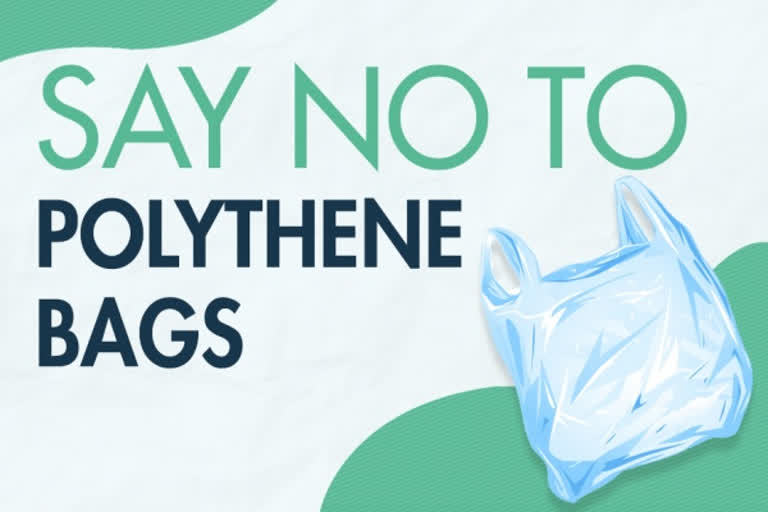Hyderabad: A rare novelty in the 1970s, plastic shopping bags are now an omnipresent global product. They are showing up in the darkest depths of the oceans to the summit of Mount Everest to the polar ice caps.
Most of us use them every day without a second thought. Whether we are out buying groceries at a local market or shopping for clothes and accessories at the mall, we are sure to leave the store with our goods neatly packed in a plastic bag. We reach home, take out our prized possessions and discard the polythene bag. Just how many of these plastic bags do we go through in a year?
We use One to Five trillion plastic bags per year! That’s 160,000 a second! And over 700 a year for every single person on the planet. But out of all these plastic bags, only 1 to 3% of plastic bags are recycled worldwide, the rest is discarded, adding to the ever-increasing plastic pollution.
Plastic bags and foamed plastic products seem to be perceived by governments as the most problematic single-use plastics, given their easily observable presence in the environment, such as windblown bags clinging onto fences or trees or floating in rivers.
Some studies suggest that plastic bags and Styrofoam containers can take up to thousands of years to decompose, contaminating soil and water, and posing significant ingestion, choking and entanglement hazards to wildlife on land and in the ocean.
Plastic bags remain toxic even after it breaks down. It doesn’t biodegrade, it photo-degrades. It means that after it degrades, it breaks down into smaller and smaller toxic bits of itself – and bleeds and contaminates the environment.
International Plastic Bag Free Day was created as a worldwide initiative to get rid of the single-use of plastic bags around the world. It is all about promoting environmental conservation by encouraging us all to stay away from the use of plastic bags and instead look for more eco-friendly alternatives.

Why say NO to Plastic bags?
- Plastic bags clog drains and waterways, threatening urban environments and creating severe safety hazards. Drainage systems blocked by plastic bags have been identified as a major cause of flooding.
- Blockage of the sewage system by plastic bags creates a public health threat. Improperly disposed of bags end up in the sewer creating blockages and waterlogging, the resultant ponds contain raw sewage and a variety of other materials disposed of via the sewer, sunlight and decomposition cause these ponds to emit toxic gases in an alarming rate.
- By clogging sewers and providing breeding grounds for mosquitoes and pests, plastic bags can increase the transmission of vector-borne diseases like malaria.
- High concentrations of plastic materials, particularly plastic bags, have been found blocking the airways and stomachs of hundreds of species. Plastic bags are often ingested by turtles and dolphins who mistake them for food.
Also read: UPI payments hit all-time high of 1.34 bn transactions in June
- There is evidence that the toxic chemicals added during the manufacture of plastic transfer to animal tissue, eventually entering the human food chain. Styrofoam products, which contain carcinogenic chemicals like styrene and benzene, are highly toxic if ingested, damaging the nervous systems, lungs and reproductive organs. The toxins in Styrofoam containers can leach into food and drinks.
- Plastic waste is often burned for heat or cooking, exposing people to toxic emissions. Disposing of plastic waste by burning it in open-air pits releases harmful gases like furan and dioxin.
Plastic bags in India
- In 1998, Sikkim was one of the first Indian states to completely ban plastic bags, and two decades down the line, it has emerged as the only one in the country to have successfully implemented the ban.
- States have issued notifications/orders introducing regulations on a complete ban on plastic carry bags. But, its enforcement and effective implementation is an issue.
- The main problems appear to be (i) a lack of enforcement and (ii) a lack of affordable alternatives. The latter has led to cases of smuggling and the rise of black markets for plastic bags or to the use of thicker plastic bags that are not covered by the bans. This has increased environmental problems in some cases.
Also read: Google introduced a new beta version for its virtual keyboard app, Gboard
- As Central Pollution Control Board (CPCB) has told the National Green Tribunal; Eighteen states have imposed a complete ban on plastic carry-bags, Five states Andhra Pradesh, Gujarat, Jammu & Kashmir, Kerala and West Bengal have imposed the partial ban on plastic carry bags/products at religious/historical places.
- Indian Prime Minister Narendra Modi announced India’s pledge to phase out single-use plastic by 2022.



